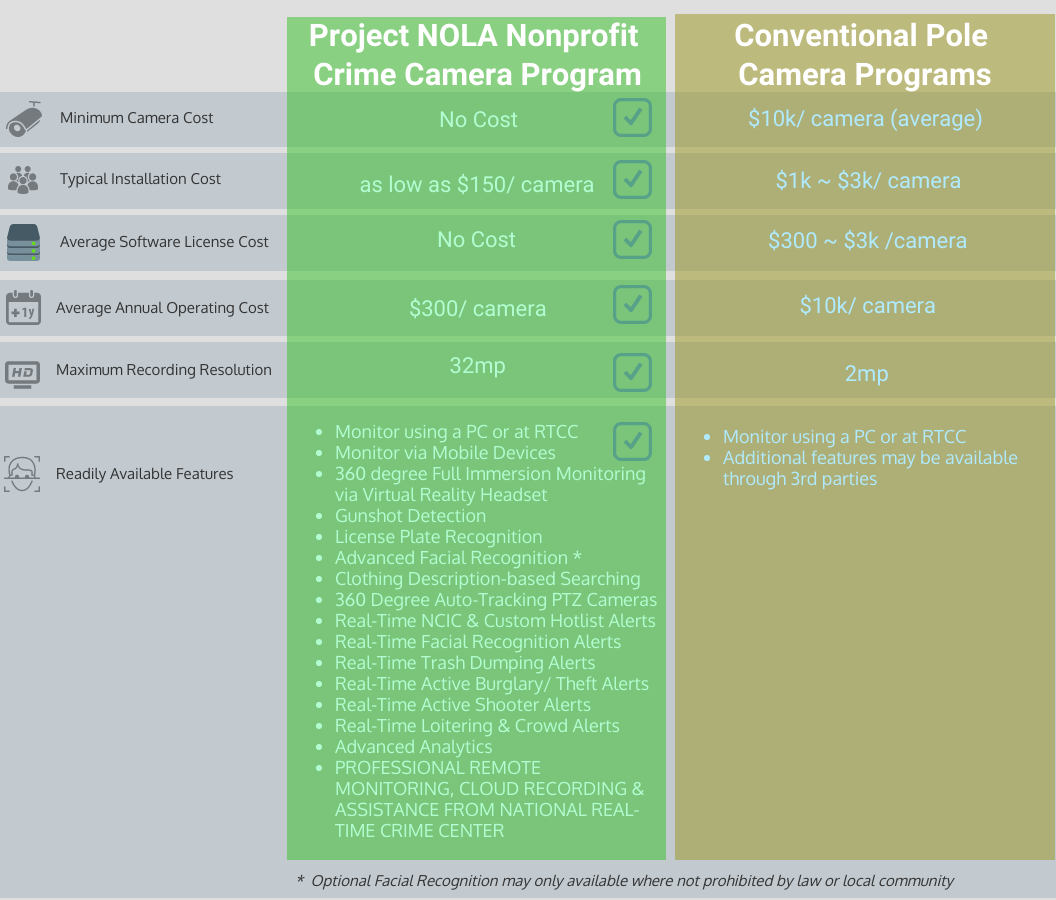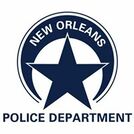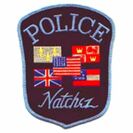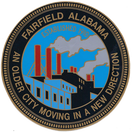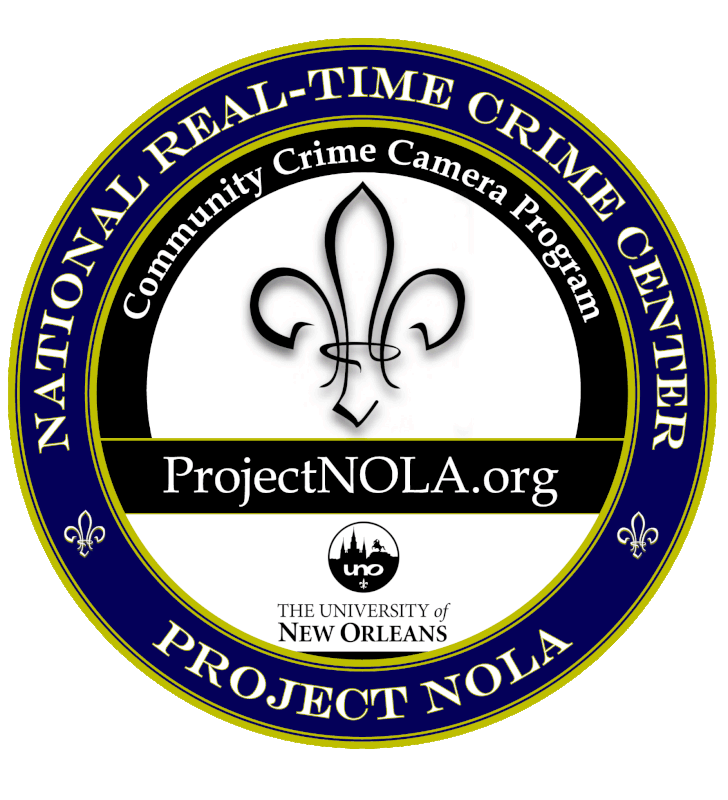Cost subsidized by charitable donations, bring the unprecedented success of America's most successful, time-proven and cost efficient Crime Camera program to your community for as little as $300/yr per crime camera or $1100/yr per Law Enforcement grade License Plate Recognition (LPR) camera! Project NOLA is available to all within the United States. Call us today to learn more or to get started.
How
|
A 501c3 nonprofit organization, Project NOLA works with individuals, associations and municipalities to place cost-subsidized High Definition Crime Cameras, Gunshot Detectors and License Plate Recognition Cameras in needed areas. Video is transmitted via the Internet to the Project NOLA National Real-Time Crime Center, where analyst provide valuable information to units responding to breaking crimes and dangerous situations. Project NOLA may also transmit live crime camera video to local RTCC's and 911 Centers.
No local RTCC? No problem! Project NOLA will work to help your police and sheriff's department create their own monitoring room. |
|
|
|
Time-ProvenThe most successful and cost effective crime camera program in America, Project NOLA has helped significantly decrease violent crime by dramatically increasing police efficiency and community support. Since 2010, Project NOLA has helped investigate over 500 homicides, thousands of felony crimes, and countless violent drug gangs. In 2018 Project NOLA helped the NOPD reduce the murder rate in New Orleans to a 47 year low while also helping communities across America see huge double-digit reductions in non-fatal shootings and robberies. Specializing in gun, drugs and gang related crimes, Project NOLA may help a police or sheriff's department take as many as a dozen illegal firearms off the street in a single night by providing Real-Time notifications on known gang members illegally carrying firearms and providing the probable cause needed for officers to justify arrests and search warrants.
|
Low-CostA 501c3 nonprofit organization, Project NOLA purchases brand new police-grade crime cameras using charitable donation and grant funds, then loans cameras directly to individuals, associations and municipalities to help local law enforcement make communities safer places to live, work and visit. Crime camera hosts or sponsors only pay Project NOLA is what it cost us to receive, record and transmit camera video to local law enforcement, which costs as little as $300/ year per camera (plus any special optional add-ons such as License Plate Recognition, Facial Recognition, etc).
There is no additional cost for PC software or mobile apps, which camera hosts and local law enforcement use to view camera video. Furthermore, there are no software licensing charges and software upgrades are free. Each crime camera also carries a 5 year manufacturers warranty. |
* The cost to host a Project NOLA Crime Camera varies depending on geographical location and historical crime trends In areas where our nonprofit program receives additional financial support via tax deductible charitable donations or receives funding from local government, crime cameras may be provided FREE of charge to area residents, schools, churches and businesses.
|
Project NOLA 25x Starlight/ Zero-Light PTZ Crime Camera able to clearly observe cats over 250' away in complete darkness.
|
Get StartedOften developing & launching community-wide crime camera programs within weeks of being contacted, individual residents, business owners, civic leaders, law enforcement professionals and government officials may quickly get the ball rolling by simply calling us at (504) 736-9187. We can custom tailor our program to meet your community's needs, raise funds, and even help to improve an existing crime camera program while also dramatically lowering its annual operating costs!
|
Case Studies
|
New Orleans, LA
In 2010 Project NOLA began to work with residents and business owners to create a privately funded community-based crime camera program, without the benefit of federal grants or local tax dollars, which has grown to currently involve over 2500 HD cameras and has helped the NOPD reduce murders in 2018 to the lowest rate since 1971. Q1 2019 murder rate is down an additional 46% vs Q1 2018! Gun violence was reduced by 82% in one of the most dangerous areas. City-wide armed robberies were reduced by over 30%. |
Natchez, MS
A charming city suddenly faced with escalating drug-related gun violence, the City of Natchez quickly turned the tables on violent criminals in 2018 by partnering with the community to place Project NOLA crime cameras with Gunshot Detection and License Plate Recognition on homes and businesses, which instantly helped detectives solve a murder and greatly disrupt illegal drug distribution. By Q3 2019, Natchez PD Chief Armstrong credited Project NOLA for a city-wide 92% reduction in Homicides and a HUGE reduction in 911 calls for service in historically high-crime areas. |
Fairfield, AL
Troubled by violent criminals emboldened by the knowledge that the local PD is woefully underfunded and understaffed, community activists helped quickly reduce street violence by placing Project NOLA crime cameras about the city, which immediately began to identify violent offenders. Due to the unprecedented success of our program a special Task Force was created by the local DA so that the FBI, DEA, Jefferson County SO, Birmingham PD, and others could also benefit from Project NOLA's local network of crime cameras. |
Project NOLA especially benefits smaller police departments by proactively monitoring crime cameras to identify/ locate violent repeat offenders and gang hierarchy. Here are some recent samples of how Project NOLA helped the Fairfield Police Department dramatically reduce violent crime in Alabama.
Project NOLA Benefits
Proven to help significantly reduce crime, increase quality of life and stimulate local economies, Project NOLA only costs a fraction of traditional crime camera programs while providing greater results, reliability and protection of people's privacy. When crimes occur, criminals are more likely to be apprehended moire quickly, sign confessions, implicate others involved, and plead guilty, saving municipalities millions in overtime pay, local incarceration and court-related costs.
